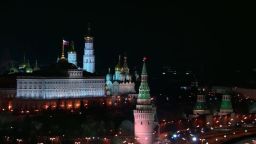The FBI was caught flat-footed by Russia’s disinformation campaign in 2016, a new bipartisan report issued by the Senate Intelligence Committee has found.
While social media companies have borne the brunt of criticism for allowing Russia to run amok on their platforms in 2016, the committee criticized the FBI for using a contractor to monitor foreign influence operations.
“The apparently outsourced nature of this work is troubling,” the committee found, “it suggests FBI either lacked resources or viewed work in this vein as not warranting more institutionalized consideration.”
The FBI declined to comment on the report.
The report echoes criticisms from former Obama administration officials who said the US intelligence community could have done more to stop Russian interference through social media in 2016.
Brett Bruen, who served as the White House director of global engagement from 2013 to 2015, said he warned colleagues on President Barack Obama’s National Security Council in 2014 that America would be targeted by Russian trolls. His warnings came after he saw how the Russians used the same methods – social media meddling and propaganda – to sow discord during Ukraine’s election in 2014.
Former CIA Director Michael Hayden drew parallels last year between the intelligence failures in the lead up to 9/11 and Russian meddling in American affairs through social media in 2016.
“I know there are serious differences here. But in terms of the intelligence analysis, pre-9/11, we knew al Qaeda was coming after us, but we thought they were coming after us in terms of US interests overseas, not in the homeland,” Hayden said.
The FBI has since set up the Foreign Influence Task Force, which periodically meets with American social media companies and has in at least one known instance alerted them to an ongoing Russian operation, though its operations are largely hidden from public view.
Latest confirmation of Russian meddling
The bipartisan report is the latest confirmation of Russian meddling in the 2016 election, which Trump still hasn’t unequivocally acknowledged.
In fact, the Senate report goes farther than the official assessment from the US intelligence community. Lawmakers determined that Russian-backed activity on social media “was overtly and almost invariably supportive” of Trump, stronger terms than in the US intelligence community’s report.
Russian trolls interfered on social media “by harming Hillary Clinton’s chances of success and supporting Donald Trump at the direction of the Kremlin,” the report said, and before that, the trolls attacked Trump’s rivals in the Republican primary.
Trump has never fully embraced the widely accepted fact that Russia helped his campaign. The Senate report echoes conclusions reached by US intelligence agencies, including Trump’s handpicked officials to lead the FBI, CIA, NSA and the Justice Department.
The report also highlights how Russia sought to foment divisions in US society.
“By far, race and related issues were the preferred target of the information warfare campaign designed to divide the country in 2016,” the committee said, and that no group was targeted more than African Americans.
CNN has previously documented how Russian operatives ran fake Facebook pages that posed as Black Lives Matter groups, organized protests, and even hired unwitting Americans to undertake tasks in the United States.
As part of its recommendations, the committee called on the Executive Branch to set up an interagency taskforce to monitor and assess “foreign country’s use of social media platforms for democratic interference.”
The committee also recommended setting up an awareness campaign about disinformation. Some states have created their own anti-propaganda efforts, but there is no national strategy in place.
Warnings about new disinformation tactics
The committee warned that disinformation campaigns have begun moving to messaging platforms like WhatsApp, Telegram, and WeChat, which are more difficult to monitor than platforms like Facebook and Twitter.
It also warned about deepfakes and artificial intelligence technology that can be used to create convincing fake video and audio. “Although these capabilities are relatively nascent, they are being perfected at a pace that eclipses the effort to create the technology for detecting and mitigating fraudulent media content,” the report concluded.
Special counsel Robert Mueller indicted the Russian troll farm at the center of the Senate report, the Internet Research Agency, its oligarch founder Yevgeny Prigozhin, two of his other companies, and employees who worked for the troll farm.
Prigozhin has remained safely in Russia and laughed off the charges. But one of his companies hired US lawyers and is fighting the case. It filed a new motion to have the charges dropped a few hours before the Senate report was released on Tuesday. A trial is slated for next year.
As is typical for Russian oligarchs, Prigozhin does not have a government role but has spent millions of dollars doing the Kremlin’s bidding. Both sides strongly deny any direct coordination.
The Senate report flatly rejected these denials, saying the evidence they uncovered points to “significant Kremlin support, authorization, and direction of the IRA’s operations and goals.” Lawmakers also accused Russian President Vladimir Putin of lying when he has publicly denied knowing about the St. Petersburg troll farm, saying “the Committee finds this denial to be false.”
























